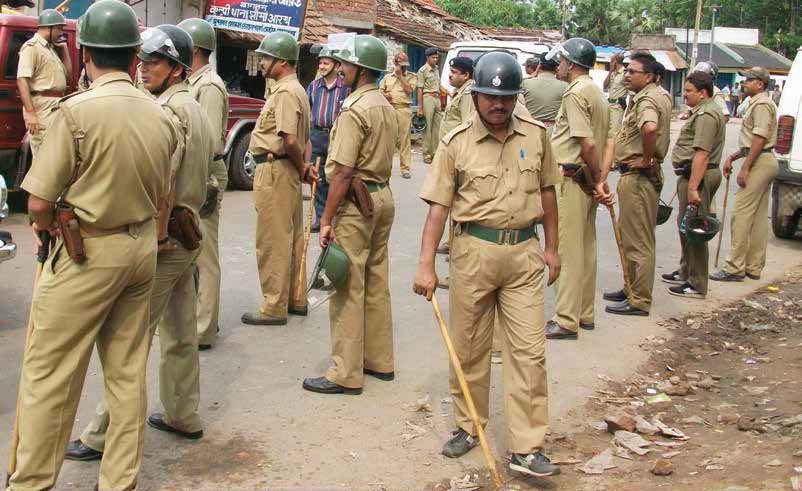This article is written by Anubhab Banerjee, from the School of Law, Alliance University. It deals with the provisions of the Code of Criminal Procedure, 1973 with regard to judgement and order.
Table of Contents
Introduction
The Indian legal system has two branches i.e. civil and criminal. Civil law mainly deals with contracts and torts. Criminal law mainly deals with crimes committed against the community. The Code of Criminal Procedure, 1973 is a manual for the Indian Legal system which deals with Criminal Law. This article deals with judgements and orders which are passed under the Code of Criminal Procedure.
What is a Judgement?
A judgement is a decision given by a person regarding a particular issue. A judgement under the eyes of the law is a decision given by a court of law on a suit which comes up to it. The Code of Criminal Procedure in India does not define a judgement. Though Chapter 27 of the code deals with the matters relating to a judgement and its delivery. A judgement can be considered to be the final order passed by a criminal court, which may either be pronounced as a conviction of the accused if such person is found to be guilty or as an acquittal of the accused if such person is found to be innocent.
The Supreme Court of India, in the case of Surendra Singh v. State of U.P., 1953 defined judgement as “the final decision of the court intimated to the parties and to the world at large by formal ‘pronouncement’ or ‘delivery’ in open court.”

Provisions with regard to Judgement under CrPC
The following are the provisions with regards to a judgement under the Code for Civil Procedure:
Section 353
This section helps us understand the process of procurement and pronouncement of a judgement. It says that the pronouncement of judgement in every trial in a criminal court should be done in an open court as soon as a trial subject to that court is terminated. Such judgement should be pronounced by a presiding officer who is in charge of the criminal court of original jurisdiction. Such an officer passing the judgement should sign the transcript and every page, as well as the date of the judgement, pronounced should be attached to such a document.
If the accused related to a judgement is under custody, then such person should be brought to the court when the judgment is being pronounced. If the accused is not in custody then his presence shall be demanded by the court, at the time of passing the judgment. If there is more than one person then the absence of any of them will not have any effect in delaying the judgement. A copy of the judgement should be made available to all persons associated with the case.
The absence of a pleader during the pronouncement of a judgement shall not be deemed to be enough reason for causing any delay in a judgement.
Section 354
This section tells us about the language which should be used while pronouncing a judgement. It basically says that unless anything is expressly mentioned under the judgement passed under section 353, the judgement should be made in the official language of the respective court.
This section also helps us understand the ideal contents of a judgement. It basically explains the different instances under which the court passes judgement and the reasons which are required to be given by a court, which shall be attached to the respective judgements.
Section 355
This section provides instructions which are required to be followed by a Metropolitan Magistrate while pronouncing a judgement.
Section 357
This section talks about the power of the court to demand compensation from the accused with regard to the losses incurred by the other party to the suit. Such compensation may be for the costs of the proceeding, compensation for causing harm, injury or death, etc. There is a particular period of time provided for an appeal against such demand of compensation by the court. Once such period expires, the accused shall be liable to pay such compensation.
Section 358
If a person gets arrested due to another person registering a false complaint against such a person with the police. Then the court shall order such a person who posted the complaint to pay compensation which shall not exceed one thousand rupees, to the person so arrested. Such compensation is required to be paid for the lost time and money of such a person so arrested.
If there is more than one person who has been arrested under such circumstances, then compensation of rupees hundred such be paid to each person.
Section 361
This section tells us that under the following circumstances special reasons supporting the judgement should be recorded:
- Where an accused is a person under section 360 or under the provisions of the Probation of Offenders Act, 1958.
- When an offender is a person supposed to be considered under the Children Act, 1960.
Section 362
This section tells us that once a judgement is pronounced, no change shall be made by the court or the presiding officer on such judgement. Unless the appeal is filed at a higher court.
Section 363
This section tells us that a copy of the judgment pronounced by the presiding officer of the court shall be given out to the accused, the complainants and all such persons associated with the proceeding in reference to which such a judgement has been passed.
Section 364
This section provides that every judgement pronounced by a court should be recorded. In an instance where such judgement is not in the language of the court and the accused requires so, then the judgement should be translated into the language of the court and stored accordingly.
Section 365
This section tells us that in case a judgement is pronounced by a court of session or by a Chief Judicial Magistrate, then a copy of such a judgement should be sent to the office of the District Magistrate.
What is an Order?
An order is a command which is given by a judge, with relation to a proceeding at a court. Though the order is not always the end of the court proceeding. Only if such an order passed is the final order of a case, it shall be considered to be a judgement and shall be capable of ending a court case. Otherwise, orders are passed in between court proceedings to take care of the case and the things associated with it. There are certain orders which are given by the court under chapter 27 of the Code of Criminal Procedure, 1973. However, the term order is not defined under CrPc and finds its meaning under the Civil Procedure Code.
Provisions with regard to Order under CrPC
The following Sections under the Code of Criminal Procedure talks about orders:
Section 356
This section tells us about an order regarding notification of the address of a previously convicted person.
Section 357
This section tells us that the court may order a person to pay compensation in case such a person’s complaint to the police leads to a false arrest of another person. Such compensation shall be paid to the person so arrested. The amount of compensation ordered can be maximum of one thousand rupees. If more than one person is arrested for such a complaint, then a compensation up to rupees hundred for each person can be ordered by the court.
Section 359
Under this section the court shall order compensation to be paid by the accused to the complainant of the case, considering that it is a case of a non-cognizable offence. The compensation is equivalent to the costs of the proceeding which are incurred by the complainant. Such an order may even be passed by an Appellate Court.
Section 360
This section tells us about an order of the court through which a convict can be released on probation of good conduct or after a firm warning.
Section 413
This section helps us understand the process for execution of an order under the Indian legal system.
As a general rule, an order of a court is founded on objective considerations and as such the judicial order must contain a discussion of the question at issue and the reasons which prevailed with the court which led to the passing of the order.
An order may originate from a suit by the presentation of a plaintiff or may arise from a proceeding commenced by a petition or application. Rights of the parties with regard to all or any of the matters in controversy may or may not be finalized in an order. Also, in the case of a suit or a proceeding, a number of orders may be passed. Every order is not appealable, only specific orders provided for in the Code are appealable. No Second Appeal lies in case of Appealable Orders.
What are the differences between a judgement and an order?
A judgement and an order work in coherence along with other elements under the judicial process in order to evaluate the issues with regard to the case matter before the court, as per provision under the code of criminal procedure. A judge occupies the seat of the decision-maker on behalf of law and judiciary. He has the power to allow and grant orders and judgements as decisions to be implemented on and by the parties upon the subject matter of the case. The composition, purpose, grounds and legal consequences of a judgement and order are very distinct as per their nature and thus are provisioned separately under the code. It is imperative to understand them in order to understand and utilise their purpose under the judicial procedure and practice. They must not be confused in terms of their nature and work. A distinction, in brief, is given below:
|
Basis/Distinction |
Judgement |
Order |
|
|
1. |
Criminal Procedure Code, 1973 |
Chapter XXVII of Crpc deals with judgement though there is no proper definition provided under the act. |
An Order as well is not defined under Crpc. |
|
2. |
Definition |
Judgment is the statement given by the Judge on the grounds of a decree or order |
The formal expression of any decision of a Criminal Court which is not a decree. |
|
3. |
Purpose |
A judgement declares the final decision of the court upon the matter, summing up all the evidence and arguments presented and procedure evaluated along with the decree and order passed in the regard. It justifies itself based on the entirety of the case matter. |
An order is passed where an immediate or urgent action or implementation is required. It could be sealing off the property to not be sold or exploited that forms the subject matter of the case by any party, or security of it or any of the parties to the matter. |
|
4. |
Legal nature |
A judgement is appealable before the provisioned superior court. |
There are two kinds of order: appealable and non-appealable |
|
5. |
Grounds of decision |
A judgement essentially carries along a statement pertaining to the grounds of such decision being passed. |
An order is followed by a necessary discussion upon the issue regarding which it has been passed. However, it need not carry any grounds of explanation along with it. |
|
6. |
Stage of the case |
A judgement is passed at the finality of the case that addresses the final execution of the decision taken upon hearing and evaluating the whole matter and the procedure. |
An order can be passed as well as asked for by either of the sides at any stage of the case. |
|
7. |
Discretion of the Judge |
A judge is bound to give a judgement in order to dismiss or decide a case. |
A judge is not bound to pass an order asked by the parties). He may pass an order if he deems fit in the favour of the welfare, security or urgency to the parties or the subject matter of the case. |
Conclusion
A judgement and an order under the Code of Criminal Procedure, 1973 may seem to be quite similar concepts but have significant differences, as have been portrayed in this article. The concepts of judgment and order may not have been defined under CrPC but both the provisions form a very vital aspect of the criminal law system in India. Judgement decides on the finality of a case while an order is more of an interim measure. Thus, both of these are essential instruments for all criminal courts across India.
References
- http://www.differencebetween.net/miscellaneous/difference-between-judgment-and-order/
- https://www.pathlegal.in/Difference-between-Order-Judgment-and-Decree-blog-2296957
- https://www.docsity.com/en/distinguish-between-order-judgment-and-decree/4241850/
- https://devgan.in/crpc/chapter_27.php#s360
- https://devgan.in/crpc/section/413/
LawSikho has created a telegram group for exchanging legal knowledge, referrals and various opportunities. You can click on this link and join:
 Serato DJ Crack 2025Serato DJ PRO Crack
Serato DJ Crack 2025Serato DJ PRO Crack










 Allow notifications
Allow notifications


